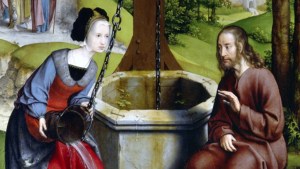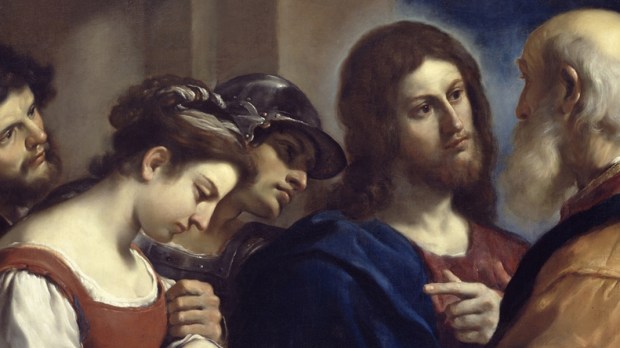Next Sunday is Passion Sunday. But the readings this Sunday, the Fifth Sunday of Lent, Year C, show all the drama and victory of passion week, as it applies to one person — and thus how it applies to each of us.
It’s the Gospel story of the woman caught in adultery and Jesus saying, “Let he who is without sin cast the first stone.”
The first two lines of this Gospel are as significant as its famous lines.
“Jesus went to the Mount of Olives,” it begins. “But early in the morning he arrived again in the temple area.”
Think of what that means. If he arrived at the Temple “early in the morning” when was at the Mount of Olives? In the middle of the night. What was he doing there?
The Mount of Olives is significant for Jesus. It is the setting for the Agony in the Garden — that terrible moment when Jesus takes the sins of mankind onto himself, before being betrayed and led to his death.
His Agony in the Garden experience is so significant that he seems to anticipate it when he comes to Jerusalem. The Mount of Olives is the place where he stops to cry for those who are going to kill him.
So when the Gospel mentions his night in the Mount of Olives, it is filled with significance: This is the place Jesus sacrifices and prays for sinners.
The other characters in the story were also up late that night — but they weren’t praying.
The scribes and Pharisees drag a woman before Jesus and say, “Teacher, this woman was caught in the very act of committing adultery.”
Evidently, the woman was spending the night with a man and the Pharisees were spending the night spying on them — and gathering an angry mob to get the woman, but not the man. Now, they try to trap Jesus.
“In the law, Moses commanded us to stone such women,” the Pharisees tell Jesus. “What do you say?”
It is important to note what Jesus does not say.
Jesus doesn’t say the law is wrong about adultery, and he doesn’t say it is wrong about stoning.
In fact, the whole story of the Passion and death of Jesus presupposes that sinners deserve punishment — punishment Jesus took onto himself.
Soon-to-be-saint John Henry Newman describes what the Agony in the Garden must have been like. He says several saints have been given the sensation of the true, spiritual pain of sin — but only for a split second because if they experienced it longer it “would have killed them.”
On the night before he died, Jesus experienced the full pain of not just one sin, but of all the sins of mankind. “God alone can bear the load of it,” wrote Newman, describing “Hopes blighted, vows broken, lights quenched, warnings scorned, opportunities lost; the innocent betrayed, the young hardened, the penitent relapsing, the just overcome, the aged failing … the anguish of shame, the pining of disappointment, the sickness of despair.”
Our sin was “heartrending, revolting, detestable, maddening,” to Jesus, he said. That is because sin is a horrifying betrayal of who we are. God has showered us with gifts and talents. When we sin, we freely put them at Satan’s disposal in his rebellion against God.
Jesus, in the Mount of Olives, makes himself guilty of all of it, so he can suffer the punishment we deserve.
The woman’s act of adultery did get punished by stoning after all — only with Jesus as the victim, when “his sweat became like great drops of blood falling down upon the ground.”
Jesus says to the Pharisees, “Let the one among you who is without sin be the first to throw a stone at her” — but then Jesus, the one without sin, takes the stoning for her.
The other readings show the cosmic drama that happens in the salvation of every human heart.
“See, I am doing something new!” the Lord says in the first reading of Isaiah. This is the voice of God, explaining what is really happening in his incarnation, death and resurrection.
He “opens a way in the sea, and a path in the mighty waters,” says Isaiah, then abruptly switches metaphors, as if one image can’t adequately express what’s going on: “In the desert I make a way, in the wasteland, rivers.”
If we truly grasped the gift of salvation we would react like St. Paul. “I have accepted the loss of all things, and I consider them so much rubbish, that I may gain Christ and be found in him.”
The Gospel ends the way our Lent should end.
The accusers walk away, one by one, starting with the older, wiser ones. Then Jesus straightens up and looks at the woman — and at each of us who have sinned.
He asks, “Woman, where are they? Has no one condemned you?”
She says “No one, sir.”
“Neither do I condemn you,” says the man who will soon die because of her adultery, and because of my sins, too. “Go, and from now on do not sin anymore.”

Read more:
Whatever happened to the woman at the well? Some traditions tell us

